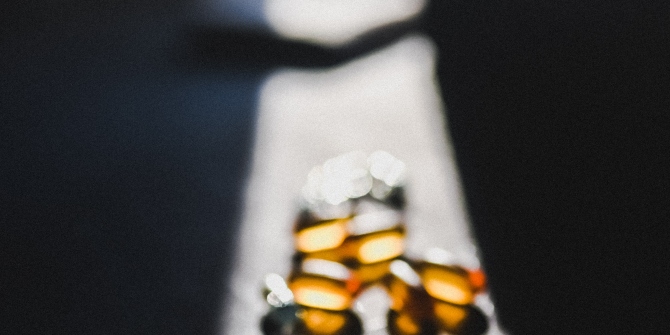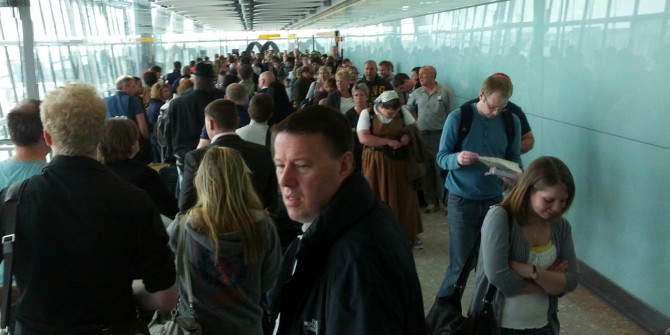
Shutdowns of illicit marketplaces on the dark web lead to more drug trade in the streets. Illicit drug trade crimes for heroin, crack cocaine and marijuana increased by 5% to 10% in the US during the two weeks following shutdowns of dark-web marketplaces.
If you thought your nerdy classmate could never ever become a drug lord, you might have to change your mind. Online trade in illicit drugs has boomed during the last decade, with the fraction of drug users buying drugs online doubling from 2014 to 2017 in the US — from 7 to 14 per cent, according the Global Drug Survey. Trading illicit drugs online thrived thanks to cryptocurrencies and the rise of the dark web, a hidden part of the web where illicit drug markets prosper. These technological innovations allowed criminals to trade drugs online while being relatively anonymous and untraceable. Operators in the illicit drugs business moved online because dark-web marketplaces overcome some of the traditional problems of street drug trade. There is a much lower risk of being sold impure substances or incurring into violence while buying or selling substances. In fact, dark-web marketplaces face lower rate of scams and higher drug purity than the street drug trade, and people use them because they feel safer.
What happens when these websites get shut down? Do operators in the illicit drugs market start going back to the streets? Does this also cause an increase in property and violent crimes? My paper answers this question by looking at detailed data about crime in the US and combining it with information about shutdowns of dark-web marketplaces.
I compare crimes in days immediately before and after shutdowns of dark-web marketplaces. I consider days immediately before shutdowns as a good proxy for what would have happened, in the days immediately after shutdowns, if dark-web marketplaces had not been shut down. Thanks to this counterfactual it is possible to see whether shutdowns of online drug trading platforms cause an increase in offline drug trading and crimes that are usually connected to it.
I find that online drug trading is closely connected to street drug trading. The two markets act as substitutes, with trade moving back to the streets when dark-web marketplaces get shut down. Drug trade, however, quickly moves back online as soon as new dark-web marketplaces open and gain the trust of buyers and sellers of substances. What is driving this result are crimes connected with the supply of drugs, such as distribution and transportation of illicit substances. An indication that it is harder for drug sellers to gain the trust of buyers after an unexpected shutdown of a dark-web marketplace.
I find no impact on street crimes that are usually associated to drug trading, such as assaults, thefts, prostitution, and homicides. These crimes are normally associated with street drug trade as buyers tend to commit crimes to finance their addiction and drug cartels use violence as a tool for keeping their business going.
To rationalise these findings, you need to think about the illicit drugs market as similar to the labour market. Looking for a new job is costly. You need to go through job listings, prepare a CV, get interviewed, and when you finally get a job that you like, you will think twice before going through that time-consuming and nerve-wracking experience again. The same holds for buyers and sellers of illicit drugs. When a buyer matches a seller they will normally engage in a long-lasting relationship. Shutdowns of dark-web marketplaces break this relationship, pushing un-matched buyers and sellers to look for a new match in the streets. However, buyers and sellers that were operating online are ready to go back to it, as soon as they have the possibility to do so, as they consider online trading safer.
These findings show how shutting down dark-web marketplaces has a relatively short-run impact on street drug trade. However, they prove once again how hard it is to fight drug trade and drug addiction by trying to eliminate all possible sources of illicit drugs, which is known as a supply-side policy. Drug users and criminal organisations quickly learn to adapt to these policies and find alternative ways to keep buying and selling drugs. This became incredibly clear during the COVID-19 lockdown, when dark-web marketplaces became even more popular, as trading in the streets became much riskier.
♣♣♣
Notes:
- This blog post is based on “Drugs on the web, crime in the streets. The impact of Dark Web marketplaces on street crime“, presented in the European Economic Association’s Annual Congress, August 2020.
- The post expresses the views of its author(s), not the position of LSE Business Review or the London School of Economics.
- Featured image by Anshu A on Unsplash
- When you leave a comment, you’re agreeing to our Comment Policy
 Diego Zambiasi is a PhD candidate in economics at University College Dublin. He specialises in the economic and social consequences of illicit drug policies. Diego holds a BA in philosophy from the University of Milan, a masters in public policy from the Free University of Bolzano and a masters in economics from the University of the Basque Country.
Diego Zambiasi is a PhD candidate in economics at University College Dublin. He specialises in the economic and social consequences of illicit drug policies. Diego holds a BA in philosophy from the University of Milan, a masters in public policy from the Free University of Bolzano and a masters in economics from the University of the Basque Country.






I really enjoyed reading this. Thanks for posting.